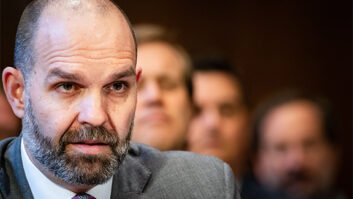
Feminist activist Amini Sboui is one of Shams Rad’s presenters. Credit: Shams Rad
TUNIS, Tunisia — Tunisia’s LGBT internet radio station Shams Rad has only been online since December 19.
But in that short time, this North African station has “received more than five thousand death threats, plus threats to burn our radio headquarters,” said Mounir Baatour. He is President of Association Shams (“Sun”), the Tunisian LGBT human rights group.
Not surprisingly, Shams Rad’s studio location is “kept secret for fear of terrorist and homophobic attacks,” Baatour said. For the same reason, many of the station’s volunteer presenters are keeping their identities secret; including having their faces blurred in staff photographs.
One exception is Shams Rad presenter/feminist activist Amina Sboui. In 2013 she posted topless on Facebook with the Arabic words “My body is mine and not the source of anyone’s honor,” written across her torso.
HIDDEN STUDIO
The reason Shams Rad is facing such pressure has to do with Tunisian culture. Despite the 2011 popular revolution that overthrew authoritarian president Zine El Abidine Ben Ali and introduced democracy, the country remains a conservative Sunni Muslim society where being homosexual is “actually punishable by Tunisian law (Article 230) with up to three years in prison,” said Baatour. Tunisia only recently ceased forced anal examinations of men believed to be gay or bisexual.
Association Shams was launched in 2015 in a bid to overturn Article 230, and end the mistreatment of Tunisian LGBTs in general. Shams Rad was created to promote the rights of “sexual minorities,” offer health advice, and counter the Tunisian media’s negative portrayal of homosexuals “where they are judged and treated as perverts,” said Baatour. “There are even some media outlets that invite imams to explain that homosexuality is a sin and that homosexuals have to be thrown from high buildings or burned alive.”
To fight back against this hateful media coverage, Shams Rad is offering a range of live streaming content that covers LGBT-related issues such as politics, culture, sex and sexual health, and the arts. Funding for the online station is being provided by the Dutch embassy in Tunisia.
Changing minds is no easy task. “We have found that homophobia is widespread in the Middle East and that all the countries of the region persecute homosexuals and condemn them to prison,” Baatour said. “Homosexuals are also often rejected from their families and find themselves without any material support; especially those who are too young to take care of themselves.” Add the risk of LGBT people being “persecuted in the street, and homophobic murders,” and the risks of being openly gay in Tunisia are very, very real.
Despite the dangers, Sham Rad’s LGBT volunteers refused to be intimated into silence. “We take these risks because we think that homosexuals are citizens like everyone else and have to be equal in rights; and we have to explain to the population that homosexuality is neither an illness nor a choice,” said Mounir Baatour.
“We want to reach a better comprehension of homosexuality in the region, a better acceptance of homosexuals in society and by the family; and put pressure on Tunisian authorities to decriminalize homosexuality.”







